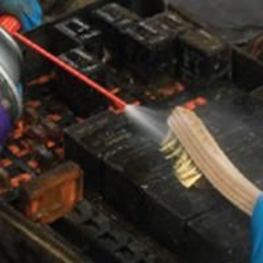Dielectric strength is defined as the maximum electric field that the material can withstand under ideal conditions without breaking down. Breaking down in this sense is described as a failure of insulating properties, where the electricity breaks free of the conductors and burns a path through the weakest area of the insulating materials. And, it’s not a breakdown over time. As soon as there is enough free electricity it will immediately or, in a nanosecond, discharge through the insulating material. If it doesn’t discharge through, it’s going to severely degrade it to the point it is of no insulating use. So you want a cleaner with high dielectric strength because you want it to clean without conducting.
Remember, certain soils such as carbon are effective conductors of electricity, and both the combination of the conductivity of the soil and cleaning solution need to be taken into consideration. You want the cleaner to act as an insulator to protect you while you are using it. It seems basic, but it should clean an energized surface, not conduct electricity back to you or to your insulating material and it should not corrupt or attack the circuit you are cleaning. When selecting a contact cleaner, look for dielectric strength in the product specifications. The higher the number the better, and you want to avoid spraying energized contacts with anything below 30 kV (30,000 volts).
What is dielectric strength?
You did not finish submitting your information to request a sample







